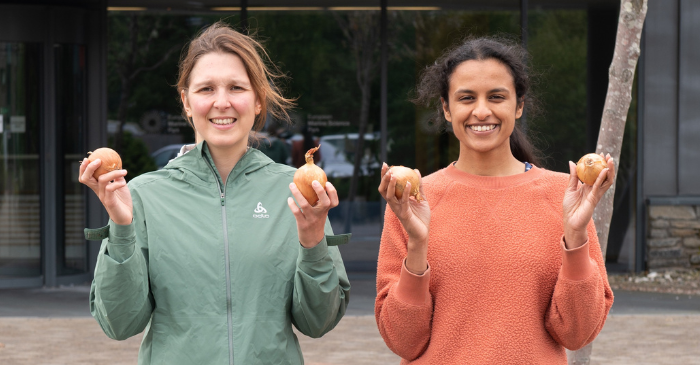Startup aims to peel back plastic use with onion skin packaging
Background
Founded by textiles specialist Renuka Ramanujam, HUID is developing a range of eco-friendly packaging materials made from onion skins and peelings. The Oban-based startup is offering an alternative to fossil fuel-delivered products – a major contributor to household waste.
HUID translates to ‘skin’ in Dutch, which is founder Renuka’s second language, while ‘ui’ is also the word for onion. Onion skins also have natural anti-microbial properties, meaning the packaging could help extend the shelf life of perishable foods.
After initially creating Blossom with an at-home 3D printer, Orlando faced challenges in scaling the business. He needed additional support to identify the best materials and optimise the design for mass production.
Challenge
The startup approached NMIS and the Advanced Materials Research Laboratory (AMRL) at the University of Strathclyde to support the next steps of turning the lab-based idea into a commercial reality.
The business has so far created two prototypes – a cardboard-like material, Pyber, and a flexible film equivalent, Cellofil, and has moved into a new lab and office space to advance its compostable packaging concept.
Producing the packaging involves extracting high-quality cellulose from onion skins and combining it in a biopolymer blend, creating a film with a mechanical strength comparable to conventional plastics.
What did NMIS do?
Researchers at NMIS and the AMRL supported the startup to create a rigorous testing regime for the onion-based materials, helping to prove its capabilities and viability as a plastic alternative.
A combination of mechanical tests and a lifecycle assessment – led by an NMIS sustainability engineer – has helped HUID to confirm the materials’ performance, functionality and environmental footprint.
Impact
Following the appointment of a chief scientific officer, HUID is preparing to launch Pyber as its first product by the middle of next year. The startup recently secured £150,000 in funding from Innovate UK to improve its processing methods and manufacturing as well as £20,000 from The Greenhouse – a climate tech accelerator programme part of the Grantham Institute and Imperial College London.
Up to 400kg of waste onion skins are produced per week, with the majority ground up for use as cattle feed, while UK households throw away an estimated 90 billion pieces of plastic packaging annually. HUID’s creative use of onion skin minimises waste and could satisfy the current market need for sustainable packaging.

Renuka Ramanujam, HUID’s founder said:
“Onion skins are nature’s own form of packaging, protecting the onion below from harm and are a plentiful waste source. Yet, after speaking to various scientists I realised that no one was using them as a material and spotted a gap in the market for a new variety of eco-friendly packaging.
“Working with NMIS and the AMRL has been instrumental in refining our products and gaining the validation we need to show buyers and consumers that the compostable packaging meets the same standards they might expect from single-use plastic or cardboard.
“Scotland boasts an excellent startup community with universities and other networks like Scottish EDGE and IBioIC providing businesses with crucial support in their early stages. They’ve not only helped me access expertise and funding but have also connected me with key industry partners and a talented pool of interns and potential employees eager to get involved with HUID and sustainable biotechnology.”
